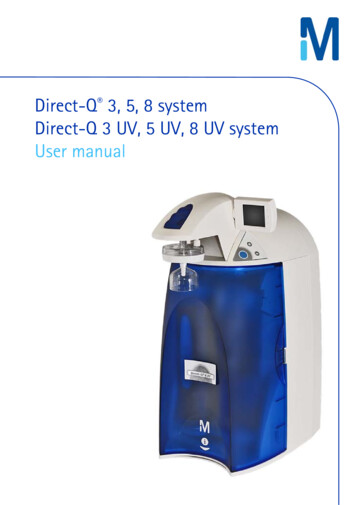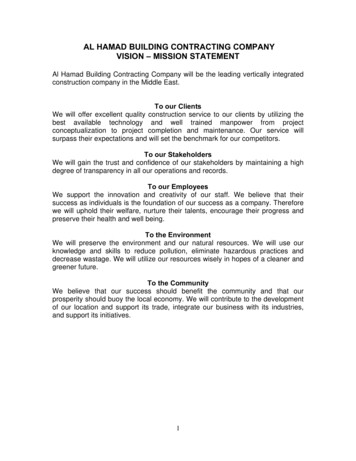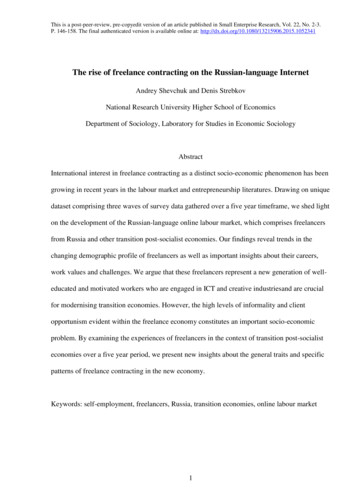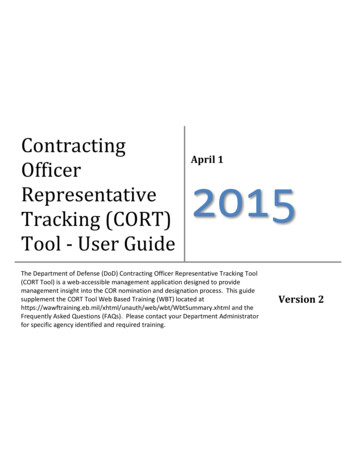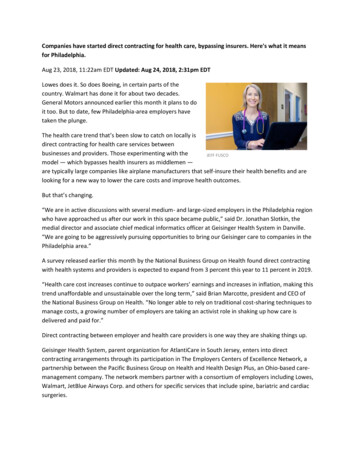
Transcription
Companies have started direct contracting for health care, bypassing insurers. Here's what it meansfor Philadelphia.Aug 23, 2018, 11:22am EDT Updated: Aug 24, 2018, 2:31pm EDTLowes does it. So does Boeing, in certain parts of thecountry. Walmart has done it for about two decades.General Motors announced earlier this month it plans to doit too. But to date, few Philadelphia-area employers havetaken the plunge.The health care trend that’s been slow to catch on locally isdirect contracting for health care services betweenbusinesses and providers. Those experimenting with theJEFF FUSCOmodel — which bypasses health insurers as middlemen —are typically large companies like airplane manufacturers that self-insure their health benefits and arelooking for a new way to lower the care costs and improve health outcomes.But that’s changing.“We are in active discussions with several medium- and large-sized employers in the Philadelphia regionwho have approached us after our work in this space became public,” said Dr. Jonathan Slotkin, themedial director and associate chief medical informatics officer at Geisinger Health System in Danville.“We are going to be aggressively pursuing opportunities to bring our Geisinger care to companies in thePhiladelphia area.”A survey released earlier this month by the National Business Group on Health found direct contractingwith health systems and providers is expected to expand from 3 percent this year to 11 percent in 2019.“Health care cost increases continue to outpace workers’ earnings and increases in inflation, making thistrend unaffordable and unsustainable over the long term,” said Brian Marcotte, president and CEO ofthe National Business Group on Health. “No longer able to rely on traditional cost-sharing techniques tomanage costs, a growing number of employers are taking an activist role in shaking up how care isdelivered and paid for.”Direct contracting between employer and health care providers is one way they are shaking things up.Geisinger Health System, parent organization for AtlantiCare in South Jersey, enters into directcontracting arrangements through its participation in The Employers Centers of Excellence Network, apartnership between the Pacific Business Group on Health and Health Design Plus, an Ohio-based caremanagement company. The network members partner with a consortium of employers including Lowes,Walmart, JetBlue Airways Corp. and others for specific services that include spine, bariatric and cardiacsurgeries.
The employers make a bundled payment for a treatment based on a diagnosis, which shifts the risk ofabsorbing additional costs from complications onto network providers. The companies give theirworkers incentives to choose Geisinger, or another network member, for their care by coveringcopayments, deductibles and travel expenses. Employees who choose to go outside of the narrownetwork pay a significantly higher portion of the treatment costs.“Patients love it,” Slotkin said, of those who chose Geisinger. “These folks get free airfare and whiteglove care. This used to be reserved for executives. Now it’s cashiers and people who stand on concreteall day getting this concierge level of care.”Slotkin said the program addresses several key issues that drive quality and efficiency of health caredelivery. Those admitted as a center of excellence have demonstrated they can provide care more costeffectively. The centers also identify and prevent inappropriate utilization, such as recommendations forunneeded surgery. In addition, the centers have an established track record for lower complicationrates.Neil Goldfarb, president and CEO of the Greater Philadelphia Business Coalition of Health, agreed directcontracting between providers and employers has been slow to take root in Philadelphia, but he said theconcept is attracting interest.“Among our members, a few large companies are testing it in some markets,” Goldfarb said. “Midsizedemployers are asking about it. Their questions are how do I make it work, how much time will I have toinvest in it, and how will I know a good deal when I see it?”Goldfarb said coalition members have asked him to look out for provider organizations that are able todeliver quality performance guarantees and alternative payment models where providers take onshared risk. “There is a more heightened awareness among companies that they have to change orhealth care costs won’t improve,” Goldfarb said. “We may be at a tipping point. Employers are realizingthey have to take on more responsibility.”Locally, direct contracting is taking place for specific services lines.Mason Reiner, co-founder and CEO of R-Health in Elkins Park, has spent six years assembling a networkof physician practice sites to position his company to contract directly with employers and others forwhat he calls “enhanced” primary care.“We’re not replacing the need for people to see specialists or receive care at hospitals,” Reiner said.“We help members achieve their optimum health and we will help them use the rest of the system ifand when the need arises.”The R-Health model features include: Same- or next-day appointments and evening office hours, Remote access to doctors with online messaging and video visits,
Data analytics and patient engagement platforms to streamline care, Proactive management of chronic conditions.“Direct Care allows me to have more valuable communication with patients,” said Dr. Julia Snyder, aphysician at R-Health’s Cherry Hill practice site. “ This affords me the ability to build a trustingrelationship, and address important underlying issues of their health like nutrition, stress, sleep,exercise, or relationships. This opens the potential of true healing; the reason I went into medicine.”In 2016 the company was awarded a contract to provide direct primary care to members of the NewJersey State Health Benefits Program and School Employees’ Health Benefits Program and their families.Members of the two state programs are covered by either Aetna or Horizon Blue Cross Blue Shield. RHealth contracts with the two health insurers on behalf of the public sector employees. The state coversthe cost of members who join R-Health.The two programs have about 500,000 eligible members, and the state’s goal is to enroll 60,000members during the first three years of the program. Reiner said since being awarded the contract, RHealth’s New Jersey public sector membership has grown consistently at a rate of about 8 percent permonth.R-Health has also started contracting directly with employers for primary care services. In January, itreached a deal with Ameriflex, a benefits administrator and payment processing firm with offices inDallas and Cherry Hill.Anne Richter, chief strategy officer at Ameriflex, said the company ran a pilot program with its ownemployees in Dallas on enhanced primary care after one of the consultants it works with asked abouthow best to price such a program. “That got us started thinking about the idea in general, so we decidedto experiment with it as an employer,” she said. “We wanted to get feedback.”Richter said employees in Dallas were given the option of joining a concierge-like primary care practice,which offered greater access to and longer appointments with primary care doctors, and Ameriflexwould pick up the cost.“The results were phenomenal,” Richter said. “Our employees loved it. They couldn’t believe theiremployers would pay for it. They got a level of access and service they never experienced before.”Ameriflex, which self-insures its health benefits, also benefited. “Our ER visits plummeted; they basicallyfell off the map,” she said. “They went from 80 the year before to six.” Richter said medical claimexpenses were down 27 percent as compared to the company’s Cherry Hill office, which has the samenumber of employees, at about 150, with basically the same demographics as the Cherry Hill office.Looking to expand the program to Cherry Hill, Ameriflex entered into an enhanced primary care contractwith R-Health that took effect Jan. 1 “The feedback is just like we encountered in Dallas,” Richter said.“The employees love it and we are seeing the same impact on claims.”
R-Health has also formed a new partnership with Pareto Captive Service, a Philadelphia-based companythat works with midsize companies — about 50 to 500 employees— that self-insure their insurancebenefits. Pareto forms and manages employee benefit group captives that limit a company's potentialhealth benefit losses.Andrew Cavenagh, managing director of Pareto Captive Services, said the firm’s strategy for helpingclients reduce their health care costs include everything from supporting the use of telemedicine toproviding access to a pharmaceutical benefit manage consortium. “We also spend a lot of time focusingon primary care,” he said. “As a country, we are under-spending on primary care. We are a fan ofenhanced primary care and we facilitate partnerships [between employers and providers] whereemployee can get better access and more time with primary care doctors who take a more holisticapproach to treating patients.”Direct contracting relationships do not involve only companies.A little more than two years ago, Cancer Treatment Centers of America in Philadelphia formed a directcontracting relationship with the Teamsters Health & Welfare and Pension Trust in Pennsauken, N.J.“It started with a single union member,” said Jeff Ryan, chief operating officer at the Philadelphiaspecialty hospital. “We took care of a patient of theirs and they wanted to expand the relationship.”Ryan said the relationship has grown into more than just taking care of union members who arediagnosed with cancer.“It has evolved into how do we become partners in the whole cancer arena?” he said. “We know acancer spend can be one of your biggest expenditures [for an organization that self-insurers their healthbenefits]. If you are a small employer it can devastate you.”CTCA, which has five hospitals across the country, has assembled an employer relations staff that callson larger employers to talk about direct contracting.“We are now in discussions with several larger employers,” said Ryan, who said he could not identifythem because of confidentiality agreements. “Some are government [entities] with large public workforces, some are very large Philadelphia firms and some are global firms with offices in Philadelphia.”Maria Scheeler, executive director of the South Jersey-based Teamsters Health & Welfare and PensionTrust, said the union has negotiated rates with CTCA that are below what it pays for its membersenrolled in Blue Cross or Aetna managed care plans. Members who opt to go to CTCA for their cancercare pay the same co-payments and deductibles they would for going to an in-network provider. Shesaid about two dozen union members have gone to CTCA for their cancer treatment, and all have beenpleased with how they were cared for.“It’s such a different kind of relationship we have with them,” Scheeler said. “The relationship goesbeyond just signing a contract. It’s a constant ongoing relationship. They are always asking what elsethey can do for us.”
CTCA holds biannual health fairs and screening programs to educate Teamster members on cancer andthe importance of screenings. “We know if we can catch cancer earlier, we have a better chance ofcuring it or treating it as a chronic condition so workers are able to keep working and are not out sick,”Ryan said.The newest initiative they are working on is a genetic testing program to identify and help memberswho are at high-risk for certain types of cancer.Officials at Independence Blue Cross, the Philadelphia region’s largest health insurer, did not expressconcern about losing market share to direct contracting.Brian Lobley, president of commercial and consumer markets at Independence Blue Cross, said directcontracting is a trend that seems to surface periodically and, nationally large employers areencountering mixed experiences with the model. “It’s not a silver bullet,” he said.Lobley said the concept of identifying providers who can provide the most cost-effective care is notdissimilar to the Blue Distinction Total Care program that involves the three dozen Blue Cross plansworking together to identify “best in class” service providers and centers of excellence in areas such ascomplex oncology, bariatric surgery and orthopedics.The Blue Cross plans’ edge, he said, is the clinical and cost data it continuously gathers by caring formore than 105 million members nationally — including the nearly 3 million IBC members in thePhiladelphia region.“That’s the valued proposition we bring when we go out and talk with employer groups,” Lobley said.The Philadelphia-area health system with the largest geographic spread of physicians and hospitals,Jefferson Health, is exploring the idea of direct contracting through Delaware Valley ACO, theaccountable care organization it owns with Main Line Health.“We’ve been following the experiences of others around country to see what makes for a successfulrelationship and why others fall apart,” said Dr. Katherine Schneider, president of Delaware Valley ACO.“We certainly talk about direct contracting.”Schneider said she’s learned direct contracting agreements take all different shapes and sizes. “It’s oneof those things where if you’ve seen one, you’ve seen one,” she said.Schneider noted nationally, it is primarily large employers exploring direct contracting and in this regionthe largest employers tend to be health systems.When Delaware Valley ACO was formed four years ago, its first role was to coordinate health coveragefor Jefferson and Main Line employees and their dependents. Combined, the Jefferson and Main Linehealth systems have 40,000 employees and self-insurer health benefits for 60,000 covered lives.
“We do have a direct employer contract and it’s with ourselves,” Schneider said. “Initially we focused onusing our providers as a preferred network, but we’ve gotten more involved with care management andcoaching, We want to demonstrate we can do this with a large population where we are at full risk.“We are constantly having conversations with potential partners about the future and different caremodels that are population health-based and not visit based. Nothing is off the table.”John GeorgeSenior ReporterPhiladelphia Business Journal
R-Health has also formed a new partnership with Pareto Captive Service, a Philadelphia-based company that works with midsize companies — about 50 to 500 employees— that self-insure their insurance benefits. Pareto forms and manages employee benefit group captive
